Please fill out the following information, and RRFC Admissions will contact you to discuss our program offerings:
Issue #167
by L. Swift and Jeff McQ
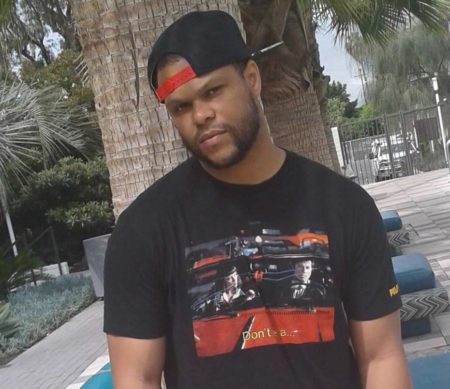 Spend a few minutes talking with Film Connection student Adam Howell, and you’ll soon discover his passion for film—most notably, horror and thriller films.
“A lot of my favorite horror movies are from 30-40 years ago,” he explains. “Some of my favorite horror films are from the 70’s. When you talk about The Exorcist, that’s still probably number one of all time…The Omen…The Shining…you know, psychological type horror.”
As a Film Connection student apprenticing with Jonathan Rizzo in his hometown, Adam soon turned attention toward screenwriting, and in particular toward breaking some of the long-held stereotypes of the horror genre.
“I just really am disappointed with the current state of horror,” he says. “When you talk about a lot of films, in the past, they’ve just been exploited because of the genre and everything like that, and people don’t really necessarily take it seriously. [With] me being an African-American man, I could never really get with how blacks were portrayed on screen in horror…I just wanted to bring a different, fresh perspective… like, let’s put a diverse urban environment with some modern day type of horror, and just try to give people something fresh, because a lot of moviegoers really do want to see something different.”
Adam isn’t just about reframing African-Americans in horror either. “I also want to [write] women from all different backgrounds, as very interesting characters,” he says, “because a lot of times women are so limited to playing just a one-dimensional type of character, even if they are someone’s girlfriend or mother.”
One thing that perhaps motivates Adam’s interest in breaking these stereotypes is the way he views horror/thriller films in general.
“The horror in the stories I write is actually more of the backdrop,” he admits. “I believe at the end of the day, it’s always about character and the everyday drama that the person’s going through that’s going to grab somebody and hold onto them…When you really identify with a character on a human level and just understand what they’re going through, it’s all about having that empathy for that person and being able to see them through their experiences or through their struggle, and basically hoping they pull out of it…I say all the time, ‘If you’re ever rooting for the bad guy in a horror film, you’ve made a bad movie.’”
In a way, Adam’s own journey into film represents a breaking of stereotypes in that he didn’t grow up dreaming of a film career. In fact, he came to this path in a more sideways manner.
“I was working… driving trolleys,” he says. “I had a secure job, a retirement plan, and pension and everything like that, but there was just something that was a little bit unfulfilling. There was this big gap inside of me…It’s funny because I never actually thought about pursuing film, but I’ve always been in love with it. I love movies, I love storytelling and everything like that, and it just got to a point where I was saying, ‘You know what, I’m not really happy. If I’m going to be doing something, I need to just go at something that really makes me happy, that gets me out of bed in the morning.’…My girlfriend actually kind of pushed me. She was very encouraging in the process because she understood how much I love film and how much I lit up when I spoke about it and she said, ‘You should go after that. You should try to do it.’”
Adam made the leap and enrolled in the Film Connection, where he not only learned the ins and outs of working on the set, but he made a connection with his screenwriting mentor, Steve Johnston.
“The thing I like about it is that the people that are actually doing it aren’t as cynical about it. They’ll tell you straight up, ‘Listen, this is not easy, because if it was, everybody would be doing it, but it’s very rewarding if you just stick with it.’”…Basically my screenwriting mentor told me to just keep at it. I think he admired the fact that I had actually done it and I don’t need anybody to tell me when to write or how much to write. I treat it seriously like an everyday type of job…He’s been very helpful with feedback on my scripts.”
Recently, Adam’s passion for film led him to take another huge leap: a move to Los Angeles to make more connections. On this topic, Adam also has a clear sense of purpose.
“I’m looking to try to extend an olive branch to somebody else and say, ‘What can I do for you?’” he says. “A lot of times people are always looking at what somebody can do for them…It’s not really genuine. They just want to get what they can get out of somebody and all that. I’m more about the long-term type of thing where it’s about building relationships and trust.”
From these beginnings, Adam has a long-term plan of starting his own production company to produce the kinds of horror films he believes need to be made. He says he’s particularly inspired these days by Blumhouse Films, the company who has released recent hits like Get Out and Split.
“I really admire what Blumhouse did when they started out,” he says, “and how they’ve progressed and built that studio over the years, and how they’re really focused on creating low budget types of horror films that are going to stand the test of time. I mean they’re doing a hell of a job over there.”
Spend a few minutes talking with Film Connection student Adam Howell, and you’ll soon discover his passion for film—most notably, horror and thriller films.
“A lot of my favorite horror movies are from 30-40 years ago,” he explains. “Some of my favorite horror films are from the 70’s. When you talk about The Exorcist, that’s still probably number one of all time…The Omen…The Shining…you know, psychological type horror.”
As a Film Connection student apprenticing with Jonathan Rizzo in his hometown, Adam soon turned attention toward screenwriting, and in particular toward breaking some of the long-held stereotypes of the horror genre.
“I just really am disappointed with the current state of horror,” he says. “When you talk about a lot of films, in the past, they’ve just been exploited because of the genre and everything like that, and people don’t really necessarily take it seriously. [With] me being an African-American man, I could never really get with how blacks were portrayed on screen in horror…I just wanted to bring a different, fresh perspective… like, let’s put a diverse urban environment with some modern day type of horror, and just try to give people something fresh, because a lot of moviegoers really do want to see something different.”
Adam isn’t just about reframing African-Americans in horror either. “I also want to [write] women from all different backgrounds, as very interesting characters,” he says, “because a lot of times women are so limited to playing just a one-dimensional type of character, even if they are someone’s girlfriend or mother.”
One thing that perhaps motivates Adam’s interest in breaking these stereotypes is the way he views horror/thriller films in general.
“The horror in the stories I write is actually more of the backdrop,” he admits. “I believe at the end of the day, it’s always about character and the everyday drama that the person’s going through that’s going to grab somebody and hold onto them…When you really identify with a character on a human level and just understand what they’re going through, it’s all about having that empathy for that person and being able to see them through their experiences or through their struggle, and basically hoping they pull out of it…I say all the time, ‘If you’re ever rooting for the bad guy in a horror film, you’ve made a bad movie.’”
In a way, Adam’s own journey into film represents a breaking of stereotypes in that he didn’t grow up dreaming of a film career. In fact, he came to this path in a more sideways manner.
“I was working… driving trolleys,” he says. “I had a secure job, a retirement plan, and pension and everything like that, but there was just something that was a little bit unfulfilling. There was this big gap inside of me…It’s funny because I never actually thought about pursuing film, but I’ve always been in love with it. I love movies, I love storytelling and everything like that, and it just got to a point where I was saying, ‘You know what, I’m not really happy. If I’m going to be doing something, I need to just go at something that really makes me happy, that gets me out of bed in the morning.’…My girlfriend actually kind of pushed me. She was very encouraging in the process because she understood how much I love film and how much I lit up when I spoke about it and she said, ‘You should go after that. You should try to do it.’”
Adam made the leap and enrolled in the Film Connection, where he not only learned the ins and outs of working on the set, but he made a connection with his screenwriting mentor, Steve Johnston.
“The thing I like about it is that the people that are actually doing it aren’t as cynical about it. They’ll tell you straight up, ‘Listen, this is not easy, because if it was, everybody would be doing it, but it’s very rewarding if you just stick with it.’”…Basically my screenwriting mentor told me to just keep at it. I think he admired the fact that I had actually done it and I don’t need anybody to tell me when to write or how much to write. I treat it seriously like an everyday type of job…He’s been very helpful with feedback on my scripts.”
Recently, Adam’s passion for film led him to take another huge leap: a move to Los Angeles to make more connections. On this topic, Adam also has a clear sense of purpose.
“I’m looking to try to extend an olive branch to somebody else and say, ‘What can I do for you?’” he says. “A lot of times people are always looking at what somebody can do for them…It’s not really genuine. They just want to get what they can get out of somebody and all that. I’m more about the long-term type of thing where it’s about building relationships and trust.”
From these beginnings, Adam has a long-term plan of starting his own production company to produce the kinds of horror films he believes need to be made. He says he’s particularly inspired these days by Blumhouse Films, the company who has released recent hits like Get Out and Split.
“I really admire what Blumhouse did when they started out,” he says, “and how they’ve progressed and built that studio over the years, and how they’re really focused on creating low budget types of horror films that are going to stand the test of time. I mean they’re doing a hell of a job over there.”
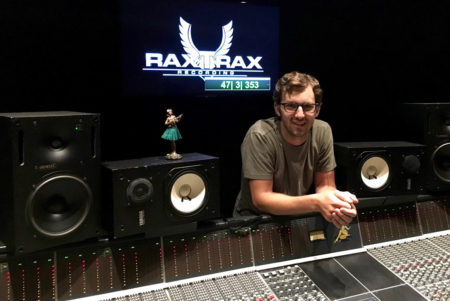 ON HIS APPROACH TO THE USE OF ANALOG VERSUS DIGITAL IN THE RECORDING STUDIO:
“My approach in terms of mixing is to utilize whatever tools I have, whether they’re analog or digital, as a means to an end. I’m trying to find what is going to most efficiently get me to my goal… Sometimes on a particular project, I know that it will require a lot of work in pieces, lots of separate sessions. In that case, to do a heavy analog production is going to be a lot of extra work that I’m going to spend documenting and recalling and documenting and recalling. That doesn’t necessarily serve the project well because it takes up a bunch of extra time. On the other hand, I know that there are times when people will perceive an advantage to one method over another. In that case I’m going to try to utilize whatever will put them more at ease or may be more comfortable for them if they want to engage in it.
In terms of the approach to mixing, unless you’re coming from tape to console to tape again, everything is going to have some sort of hybrid of digital in there. There’s a whole spectrum, so whether you go basically fully digital and you’re mixing in the box, or you have something that is heavy analog where you’re utilizing plug-ins but you’re spreading the mix out on the console and using a lot of outboard gear, or something in between such as using analog summing and hardware inserts, you’ve got to weigh what’s going to help you get the sound you’re looking for most effectively. I think that’s important to weigh so that I can be flexible and so I’m not just entirely bringing my own bias to it. Obviously, as a mix engineer, you’re going to have preferences about workflow and preferences about how something’s going to sound. Hopefully that’s why someone’s coming to you.”
ON HAVING DIFFERENT MIXING APPROACHES WITH DIFFERENT PROJECTS, OR CHANGING METHODS ON A PROJECT:
“There have been times where I’ve worked on projects where I thought for sure this is going to be an Option A mix, and I started it and felt, ‘This isn’t actually giving me what I want. I’m going to adjust to a different method.’ Sometimes the method or piece of gear we think will be the right one isn’t the right option and we need to be able to change gears in order to correct the path. I think that sometimes people who are a little bit on the outside tend to idealize certain processes as if that in itself is the thing. This tends to happen a little bit more with analog because there’s a mystique to it and marketing certainly plays into that pretty heavily. I think sometimes people will look at that process as if that is going to achieve something for them in and of itself. It may, but that’s just a piece of the puzzle. Sometimes people ignore the things that are actually more important, and they get hung up on using microphone A, B, or C or mixing console A, B, or C. Those absolutely play a factor, but they’re not going to trump the performance or the arrangement or songwriting. The tools you use can help inspire a better performance but they’re not automatically going to make something better just by using them.”
ADVICE ON BEING PROACTIVE WITH DECISIONS DURING THE RECORDING PROCESS, AS OPPOSED TO WAITING UNTIL POST:
“While you’re recording, you should always be trying to get as close to the sound you want as an end result. You should be making decisions… I worked with an artist just a couple weeks ago that was going for a particular vocal sound, and so rather than doing it after the fact, I did it while he was recording. He wanted his voice to sound like the sound of an old blues harp playing through an amp, so I set up a system to create that sound. He ended up doing the whole thing in a single take because he was like, ‘Man, I was just enjoying what was coming into my headphones. I was just vibing off of that and having a good time singing this song.’ He was able to put himself into the right frame of mind, into the right mood, right from the get-go… So the approach, the technique, all of that on my end did help inspire him and his performance, but ultimately it is the performance and not the studio technique that makes the song.”
ON HIS APPROACH TO THE USE OF ANALOG VERSUS DIGITAL IN THE RECORDING STUDIO:
“My approach in terms of mixing is to utilize whatever tools I have, whether they’re analog or digital, as a means to an end. I’m trying to find what is going to most efficiently get me to my goal… Sometimes on a particular project, I know that it will require a lot of work in pieces, lots of separate sessions. In that case, to do a heavy analog production is going to be a lot of extra work that I’m going to spend documenting and recalling and documenting and recalling. That doesn’t necessarily serve the project well because it takes up a bunch of extra time. On the other hand, I know that there are times when people will perceive an advantage to one method over another. In that case I’m going to try to utilize whatever will put them more at ease or may be more comfortable for them if they want to engage in it.
In terms of the approach to mixing, unless you’re coming from tape to console to tape again, everything is going to have some sort of hybrid of digital in there. There’s a whole spectrum, so whether you go basically fully digital and you’re mixing in the box, or you have something that is heavy analog where you’re utilizing plug-ins but you’re spreading the mix out on the console and using a lot of outboard gear, or something in between such as using analog summing and hardware inserts, you’ve got to weigh what’s going to help you get the sound you’re looking for most effectively. I think that’s important to weigh so that I can be flexible and so I’m not just entirely bringing my own bias to it. Obviously, as a mix engineer, you’re going to have preferences about workflow and preferences about how something’s going to sound. Hopefully that’s why someone’s coming to you.”
ON HAVING DIFFERENT MIXING APPROACHES WITH DIFFERENT PROJECTS, OR CHANGING METHODS ON A PROJECT:
“There have been times where I’ve worked on projects where I thought for sure this is going to be an Option A mix, and I started it and felt, ‘This isn’t actually giving me what I want. I’m going to adjust to a different method.’ Sometimes the method or piece of gear we think will be the right one isn’t the right option and we need to be able to change gears in order to correct the path. I think that sometimes people who are a little bit on the outside tend to idealize certain processes as if that in itself is the thing. This tends to happen a little bit more with analog because there’s a mystique to it and marketing certainly plays into that pretty heavily. I think sometimes people will look at that process as if that is going to achieve something for them in and of itself. It may, but that’s just a piece of the puzzle. Sometimes people ignore the things that are actually more important, and they get hung up on using microphone A, B, or C or mixing console A, B, or C. Those absolutely play a factor, but they’re not going to trump the performance or the arrangement or songwriting. The tools you use can help inspire a better performance but they’re not automatically going to make something better just by using them.”
ADVICE ON BEING PROACTIVE WITH DECISIONS DURING THE RECORDING PROCESS, AS OPPOSED TO WAITING UNTIL POST:
“While you’re recording, you should always be trying to get as close to the sound you want as an end result. You should be making decisions… I worked with an artist just a couple weeks ago that was going for a particular vocal sound, and so rather than doing it after the fact, I did it while he was recording. He wanted his voice to sound like the sound of an old blues harp playing through an amp, so I set up a system to create that sound. He ended up doing the whole thing in a single take because he was like, ‘Man, I was just enjoying what was coming into my headphones. I was just vibing off of that and having a good time singing this song.’ He was able to put himself into the right frame of mind, into the right mood, right from the get-go… So the approach, the technique, all of that on my end did help inspire him and his performance, but ultimately it is the performance and not the studio technique that makes the song.”
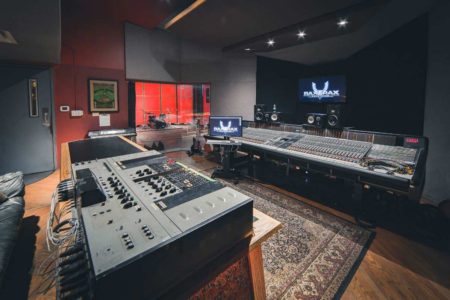
Rax Trax Recording, Chicago, IL
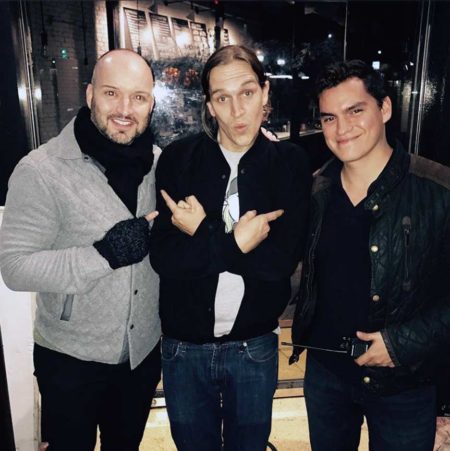 When Film Connection mentor Rob Weston, director and founder of Straight Wire Films, asked his apprentice Juan Armijos (Los Angeles, CA) if he’d like to join him on set for a couple days, Juan said yes, and he’s glad he did. He ended up working under actor/director Jay Mewes and others, including Kevin Smith, Stan Lee, Danny Trejo, and Deadpool star Gina Carano! Not too shabby! Congrats Juan!
When Film Connection mentor Rob Weston, director and founder of Straight Wire Films, asked his apprentice Juan Armijos (Los Angeles, CA) if he’d like to join him on set for a couple days, Juan said yes, and he’s glad he did. He ended up working under actor/director Jay Mewes and others, including Kevin Smith, Stan Lee, Danny Trejo, and Deadpool star Gina Carano! Not too shabby! Congrats Juan!
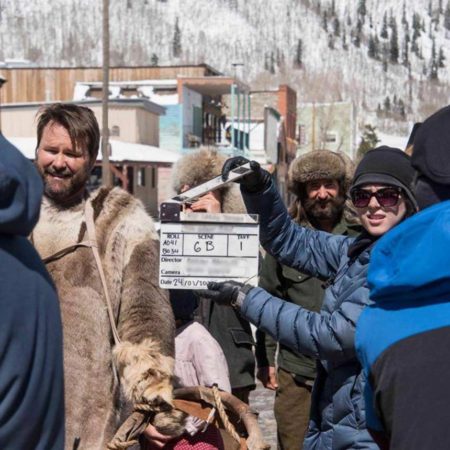 Film Connection student Rachel Svatos (Dallas, TX) who apprentices with mentor Jason Van Sickle, was responsible for the clapperboard, amongst other things, on the set of a recent Black Olive Media production. Just out of high school, Rachel is taking to filmmaking like a fish to water but, the long hours are a doozy: “As the twelve hour work days of the typical film set loom upon me, I realize that I won’t have much time to do anything while I’m working. For months at a time the sets are GO GO GO.” The hours are real, Rachel! Take those vitamins and get some rest when you can!
Film Connection student Rachel Svatos (Dallas, TX) who apprentices with mentor Jason Van Sickle, was responsible for the clapperboard, amongst other things, on the set of a recent Black Olive Media production. Just out of high school, Rachel is taking to filmmaking like a fish to water but, the long hours are a doozy: “As the twelve hour work days of the typical film set loom upon me, I realize that I won’t have much time to do anything while I’m working. For months at a time the sets are GO GO GO.” The hours are real, Rachel! Take those vitamins and get some rest when you can!

RRFC is education upgraded for the 21st century.
Get the latest career advice, insider production tips, and more!
Please fill out the following information, and RRFC Admissions will contact you to discuss our program offerings:
Stay in the Loop: Subscribe for RRFC news & updates!
© 2025 Recording Radio Film Connection & CASA Schools. All Rights Reserved.


